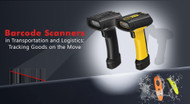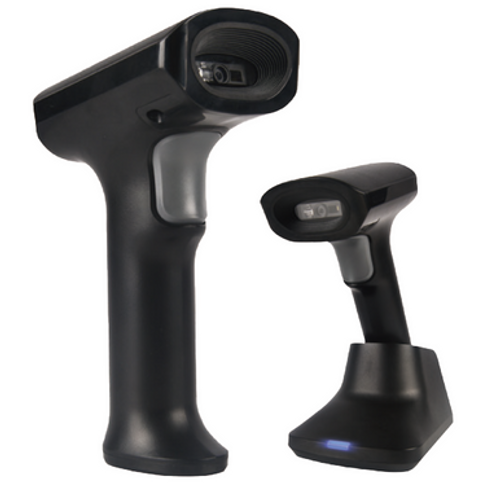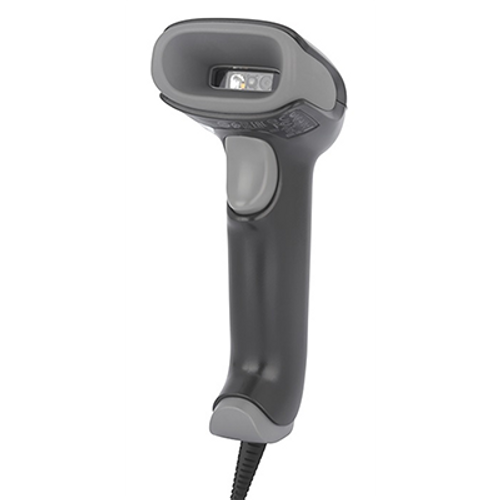Barcode Scanners in Transportation and Logistics: Tracking Goods on the Move
In the contemporary landscape of commerce and industry, characterised by rapid globalisation and the relentless pursuit of efficiency, two factors stand out as absolutely essential: efficiency and accuracy. These two principles underpin the entire edifice of modern business operations, and their importance is particularly pronounced in the domain of transportation and logistics. This is where the journey of a product or shipment begins and ends, and where the difference between success and failure can often be measured in minutes or even seconds. It is in this high-stakes environment that the barcode scanner, a technology born out of simplicity, has emerged as an indispensable tool.
In this blog post, we shall look into the pivotal role that barcode scanners, including cutting-edge 2D barcode scanners, versatile portable barcode scanners, and dynamic QR barcode scanners, play in the realm of transportation and logistics.
Barcode Scanners: An Overview
A barcode scanner, also known as a barcode reader or barcode scanner device, is an electronic device designed to read and interpret barcode symbols, which are graphical representations of data typically found on products, packaging, or documents. Barcode scanners use various technologies to capture and decode the information encoded in barcodes, making it easier to manage inventory, track products, and streamline various business operations.
Some of the popular types of barcode scanners include:
- Laser Barcode Scanners: Laser scanners use a laser beam to read the barcode. When the laser light hits the barcode, it is reflected back to a sensor, allowing the scanner to interpret the code. These scanners are known for their speed and accuracy, making them suitable for retail and warehouse environments.
- Image-based Barcode Scanners: Image-based scanners capture a digital image of the barcode, which is then processed by software to decode the information. These scanners are versatile and can read 1D and 2D barcodes, making them suitable for a wide range of applications.
- 2D Barcode Scanners: 2D barcode scanners are designed to read 2D barcodes, which can store more data than traditional 1D barcodes. They are commonly used in industries where detailed information needs to be encoded, such as healthcare (for patient records), logistics (for package tracking), and manufacturing (for quality control).
- Corded Barcode Scanners: Corded scanners are connected to a computer or terminal using a cable. They draw power and transmit data through the cable connection, making them suitable for fixed positions like point-of-sale (POS) systems.
- Cordless Barcode Scanners: Cordless or wireless barcode scanners use technologies like Bluetooth or radio frequency (RF) to communicate with a host device, allowing for greater mobility and flexibility. They are commonly used in retail stores, warehouses, and distribution centres.
- Handheld Barcode Scanners: Handheld barcode scanners are the most common type of barcode scanners and are designed to be held in the hand. They are versatile and can be used in various industries for tasks like inventory management and product tracking.
- Presentation Barcode Scanners: Presentation scanners are typically used at retail checkout counters. They are designed to be stationary, and the cashier passes the item's barcode in front of the scanner. These scanners are fast and efficient for high-volume retail environments.
- Mobile Barcode Scanners: Mobile barcode scanners are integrated into smartphones or tablets, allowing users to scan barcodes using the device's built-in camera. Various mobile apps and software solutions enable businesses to use smartphones as barcode scanners, which is convenient for fieldwork and inventory management.
- Pen-type Barcode Scanners: Pen-type scanners have a small wand or pen-like device that is swiped across the barcode to capture the data. They are less common today but were used in older systems.
- Fixed-Mount Barcode Scanners: Fixed-mount scanners are installed in a fixed position, typically on conveyor belts or production lines. They automatically scan barcodes as items pass by, making them suitable for high-speed manufacturing and sorting processes.
Note: Each type of barcode scanner has its own advantages and is suited to specific applications, depending on factors like the environment, the type of barcode used, and the required level of mobility.
Now, let us discuss-
The Role of Barcode Scanners in Transportation and Logistics
Barcode scanners play a pivotal role in the transportation and logistics industry by improving efficiency, accuracy, and overall supply chain management. Here is an elaborate list of their roles and contributions:
- Inventory Management: Barcode scanners streamline inventory management by providing accurate real-time data on stock levels. Warehouse personnel can quickly scan items as they are received, moved, or shipped, ensuring that inventory counts are always up-to-date. This minimises the risk of overstocking or understocking items and reduces the need for time-consuming manual inventory checks.
- Asset Tracking: In transportation and logistics, assets such as vehicles, containers, and equipment need to be tracked. Barcode labels or tags attached to these assets can be easily scanned to record their location, status, and maintenance history. This ensures that assets are used efficiently, reducing downtime and maintenance costs.
- Package Tracking: Barcode scanners are essential for tracking packages as they move through the supply chain. From the moment a package is picked up or received at a distribution centre to its final destination, each scan provides real-time visibility into its status and location. This information is crucial for meeting delivery deadlines, managing customer expectations, and resolving issues like lost or delayed shipments.
- Order Picking and Packing: In warehouses, barcode scanners are used to pick and pack orders accurately and efficiently. Warehouse workers can scan barcodes on items and containers to ensure that the correct products are included in each order. This minimises errors, reduces returns, and enhances customer satisfaction.
- Shipping and Receiving: Barcode scanners simplify the shipping and receiving processes. When goods arrive at a distribution centre or leave a facility, scanning barcodes on packages or shipping labels ensures that the right items are loaded onto the correct trucks or containers. This minimises shipping errors and helps prevent costly shipping discrepancies.
- Quality Control: Barcode scanning is used in quality control processes to verify the authenticity of products and ensure they meet quality standards. By scanning barcodes on product labels, manufacturers and logistics providers can track items through every stage of production and distribution, identifying and addressing quality issues promptly.
- Batch and Lot Tracking: For products with batch or lot numbers, barcode scanners play a critical role in tracking these identifiers. This is especially important in industries like pharmaceuticals and food, where traceability is essential to ensure product safety and compliance with regulatory requirements.
- Returns Processing: Handling returns efficiently is crucial in logistics. Barcode scanners are used to check the condition of returned items, verify their origin, and update inventory records. This enables companies to process returns quickly and accurately, minimising disruptions to the supply chain.
- Data Collection and Analysis: The data captured by barcode scanners is valuable for data analysis and decision-making. It provides insights into supply chain performance, order fulfilment, and inventory trends. Businesses can use this data to optimise operations, reduce costs, and enhance overall efficiency.
- Reduced Paperwork: Barcode scanners reduce the reliance on paper-based record-keeping. Digital records generated by scanning barcodes are not only more accurate but also easier to manage and store. This contributes to a more environmentally friendly and organised workspace.
Ideal Barcode Scanners for Transportation and Logistics
In transportation and logistics, the choice of barcode scanners depends on various factors such as the specific tasks, environment, and mobility requirements. Here are some types of barcode scanners that are often considered ideal for different aspects of transportation and logistics:
1. Handheld 2D Barcode Scanners
- Ideal for: General barcode scanning tasks, inventory management, and package tracking.
- Benefits: Handheld 2D barcode scanners can read both 1D and 2D barcodes, making them versatile for various applications. They are commonly used in warehouses and distribution centres for tasks like inventory management and tracking shipments.
2. Cordless (Wireless) Barcode Scanners
- Ideal for: Mobile inventory management, loading/unloading, and fieldwork.
- Benefits: Cordless barcode scanners provide mobility and flexibility, allowing workers to move freely and scan items without being tethered to a computer or terminal. They are especially useful for tasks that involve moving around large storage areas or scanning barcodes on packages during delivery.
3. Rugged Barcode Scanners
- Ideal for: Harsh and challenging environments.
- Benefits: Rugged barcode scanners are designed to withstand tough conditions, including exposure to dust, moisture, extreme temperatures, and potential drops. They are essential for transportation and logistics operations that take place in outdoor or rugged settings.
4. Fixed-Mount Barcode Scanners
- Ideal for: Conveyor belt systems and automated sorting processes.
- Benefits: Fixed-mount barcode scanners are typically used in high-speed manufacturing and sorting operations. They are installed at fixed positions along conveyor belts and automatically scan barcodes as items pass by.
5. Mobile Computers with Integrated Scanners
- Ideal for: Comprehensive logistics operations and data collection.
- Benefits: Mobile computers, often equipped with integrated barcode scanners, offer a multifunctional solution for transportation and logistics. They can run specialised logistics software, capture data, and provide real-time connectivity, making them versatile tools for various tasks, including order management and route planning.
6. Bluetooth Barcode Scanners
- Ideal for: Seamless connectivity and versatility.
- Benefits: Bluetooth barcode scanners can connect wirelessly to smartphones, tablets, or computers, making them suitable for businesses that prefer to use their existing devices for barcode scanning. They are highly portable and can be used in various logistics scenarios.
7. Vehicle-Mounted Barcode Scanners
- Ideal for: Scanning barcodes within vehicles, such as trucks and forklifts.
- Benefits: Vehicle-mounted barcode scanners are designed for use inside vehicles and can be integrated into transportation equipment. They allow drivers and operators to scan barcodes without leaving their vehicles, improving efficiency in loading and unloading processes.
8. Wearable Barcode Scanners
- Ideal for: Hands-free scanning in high-volume order picking operations.
- Benefits: Wearable barcode scanners, such as ring scanners or wrist-mounted devices, free up workers' hands and improve productivity in tasks like order picking and packing.
9. Long-Range Barcode Scanners
- Ideal for: Scanning barcodes on distant or elevated locations.
- Benefits: Long-range barcode scanners are equipped with technology that allows them to scan barcodes from a considerable distance, making them suitable for applications like scanning barcodes on high shelves or signage.
Tips to Choose the Right Barcode Scanner for Transportation and Logistics Business
Choosing the right barcode scanners for your transportation and logistics business is essential for optimising operations and ensuring efficiency. Here are some key factors to consider when selecting barcode scanners for your specific needs:
- Barcode Type and Compatibility: Determine the types of barcodes you will encounter in your operations. Common barcode types include 1D (e.g., UPC, Code 39) and 2D (e.g., QR codes, Data Matrix). Ensure the chosen scanners can read the barcode formats used in your industry.
- Scanning Distance and Range: Consider the scanning range and distance needed for your operations. If you need to scan barcodes on large or distant objects, you may require scanners with extended ranges, such as long-range laser scanners.
- Mobility Requirements: Assess whether your team needs corded or cordless (wireless) barcode scanners. Cordless scanners provide greater mobility and flexibility, making them suitable for warehouse, distribution, and fieldwork.
- Durability and Environment: Evaluate the working environment. If your scanners will be exposed to dust, moisture, or extreme temperatures, choose models with the appropriate ruggedness and environmental protection (e.g., IP ratings) to withstand these conditions.
- Scan Speed and Accuracy: Determine the required scan speed and accuracy for your specific tasks. High-speed scanning may be necessary in fast-paced environments, while precision is crucial for tasks like inventory management.
- Integration and Compatibility: Ensure that the chosen barcode scanners can integrate seamlessly with your existing software and systems. Compatibility with your warehouse management system (WMS) or inventory management software is essential for data synchronisation.
- Ease of Use and Ergonomics: Consider the user-friendliness and ergonomics of the barcode scanners. Employees will be more productive and comfortable if the devices are easy to hold and operate for extended periods.
- Battery Life (for Cordless Scanners): If you opt for cordless scanners, assess the battery life. Choose models with batteries that can last through a full shift to avoid frequent recharging or battery replacements.
- Connectivity Options: Check the connectivity options. Some scanners support USB, Bluetooth, Wi-Fi, or even cellular connections. Ensure the chosen scanners can connect to your devices and network infrastructure.
- Cost and Budget: Consider your budget constraints. Barcode scanners vary widely in price, so balance your requirements with your available budget. It's essential to invest in scanners that provide the necessary features and durability without overspending.
- Service and Support: Research the manufacturer's reputation for customer support and warranty options. Reliable support can be crucial in case of technical issues or maintenance requirements.
- Future Scalability: Think about your business's growth potential. Choose barcode scanners that can scale with your business and adapt to changing needs, reducing the need for frequent equipment upgrades.
- User Training: Factor in the training required for your employees to use the chosen barcode scanners effectively. Opt for devices with intuitive interfaces to minimise training time and costs.
- User Feedback: Seek input from employees who will be using the scanners regularly. Their insights can provide valuable information about ease of use, functionality, and practicality.
Wrapping Up,
If you are browsing the internet to find the best POS barcode system to streamline your transportation and logistics business, you’ve landed on the right page. POS Sales Australia is an established online reseller of premium point of sale (POS) products, all available at competitive prices. Browse through our selection and make your purchase with us today!
Contact us for any inquiries or speak directly to our POS expert @ 1300 026 062



